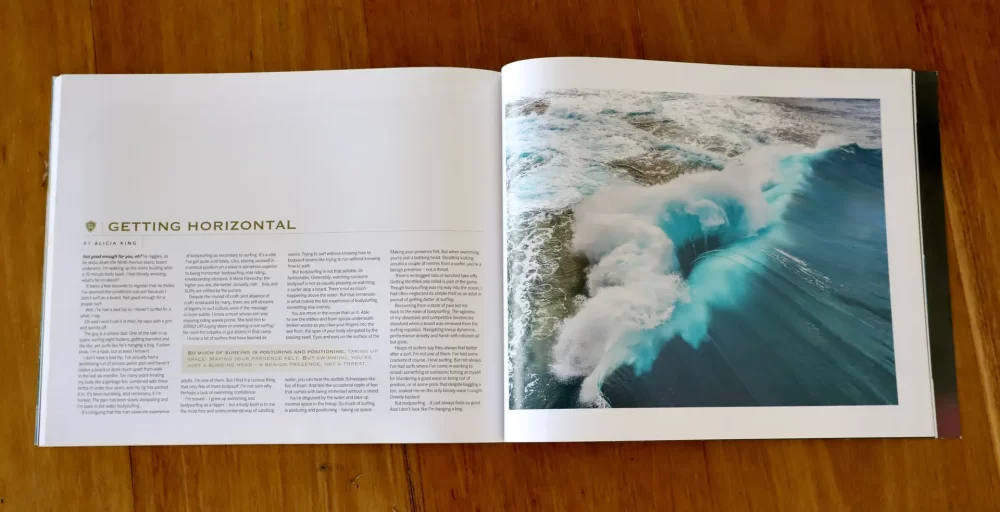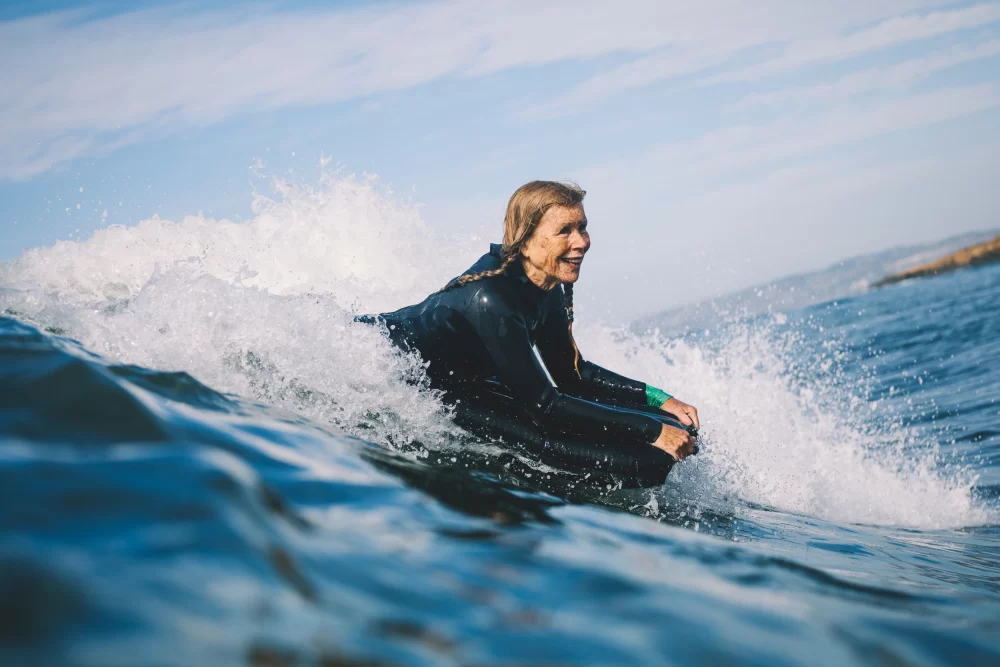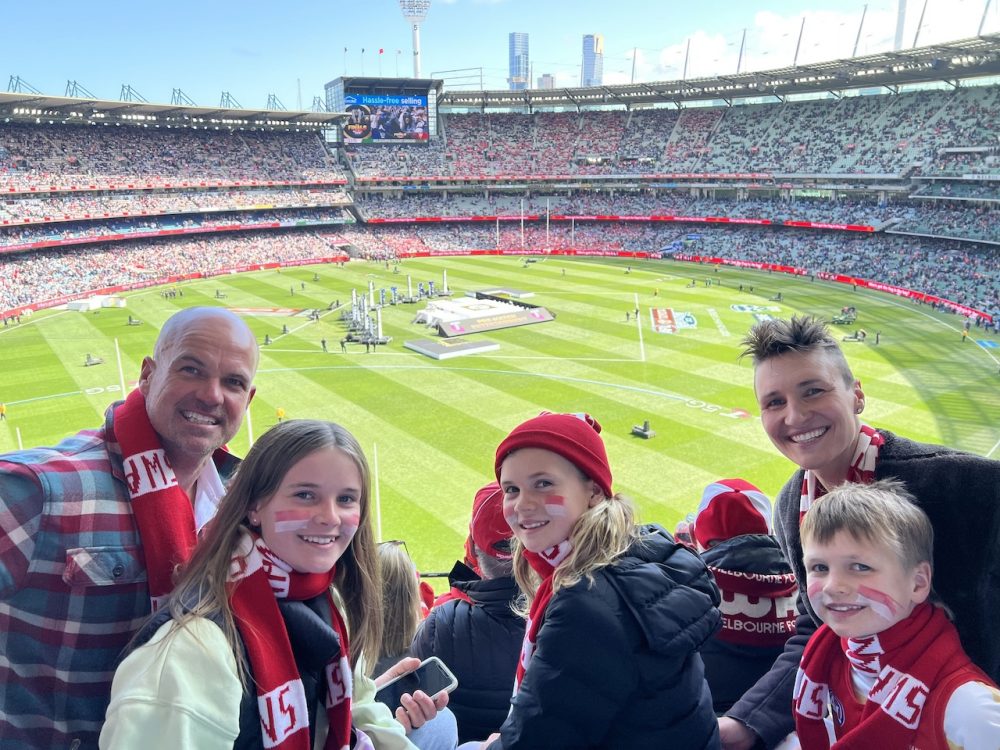Nick Carroll is prone to cackling — loud belly bursts of impromptu laughter when he finds something amusing, interesting, or when he is just plain happy: which is often.
He throws his head back, roaring, upon spotting a gaggle of young nippers rolling in the Newport shore break. His laughter booms as he eyes an old friend on the wooden decking that overlooks Newport peak, pumping his fist overhead. And he chuckles and softens towards an old staffie hobbling towards him for a pat.
The 63-year-old Newport resident, and long-time surf writer, is curious about almost everything, and hums with a vigour that belies his age.
He has somehow sustained the joie de vivre that propelled him and little brother — pro surfing World Champion — Tom Carroll to run to the beach each morning as kids. They’d surf their foam Coolite boards while their dad, Fairfax journalist Victor Carroll, swam and ran the beach. Mother Janet and sister Josephine rounded out the Carroll clan, though fate reduced the family unit to a trio of men: Janet died of pancreatic cancer when Nick was 9, and Josephine later died in a car accident. Victor forged on, remarrying and having two more daughters, Lucy and Annie. He passed away in 2019, aged 94.
Though his little bro gets most of the gun surfer cred, Nick — a voracious competitor and founding member of Newport Plus Boardriders — won two Australian Surfing Championships in 1979 and 1981. The Australian title, and particularly defending it, held significant meaning for him,
“I’d grown up idolising the Australian champions — Nat Young, Midget Farrelly, Phyllis O’Donell — more so than the world champs. I thought it was really worth having a crack at. I won once, and thought you’ve only really won it when you’ve defended it. So, I won again, just to make sure” he says laughing.
Pro surfing and a world title never beckoned, for a couple of reasons,
“I didn’t really feel like going for a world title was my thing. And I knew it was really Tom’s thing. I seriously did not want to go into battle with Tom for a world title, I thought it would be destructive for both of us.
I also really liked to write and am a natural observer. I felt it would be a waste if I didn’t pursue writing, wrestle with it, and try to get good at it.”
His first published story was a somewhat unkind surf movie review in a 1977 issue of Tracks. In time he became editor and his incisive and unapologetic takes on surf culture made him a go-to authority on all things surfing. He’s also contributed to many mainstream publications and written documentaries including Bombora: The Story of Australian Surfing.
He says, writing has offered an infinite challenge:
“Writing is something that doesn’t end. You never stop improving as a writer. You can keep getting better at it forever, really: until you’re dead.”
His appetite for growth sparked a move to the United States in the early 90s — wife Wendy and young children Jack and Madeleine in tow — where he became Editor-in-chief at Surfing magazine. Last year it drove him to take on the role of kickstarting Surfline in Australia, tackling “one of the greatest challenges in media” — taking a brand and making it work in the context of a new country. This job has morphed into now overseeing all Surfline’s editorial teams and worldwide content.
When asked what work he is most satisfied with, he responds “I’m not really satisfied with any of the work I’ve done, it’s been a constant process of failure.” This serves to engage him further in his writing process, embracing Samuel Beckett’s tenet “Fail again. Fail better.”
A driving force in his writing is to “cut the crap” and get to the “heart of things really fast,” as is seeking to understand his subject matter. The 2013 biography TC, Tom Carroll was ostensibly Tom’s story, but writing it enabled Nick to “explain something to myself” about the way both their lives had unfolded. He reveals much of himself in this book and unflinchingly explores the uglier parts of not only Tom’s, but also his own life.
The ugly. The joyful. The unexpected. The metaphysical. Nick talks about all these things as we sit in his tidy but homely office, his new Border Collie pup not far from his always bare feet.
What about surfing? This act he has fashioned his life around. What does surfing mean now?
“I’m not really obsessed by surfing anymore, but I’m deeply engaged with it. I try to hold it really lightly in my hand and I hugely enjoy it, now more than ever, I think.”
He’s in the water most days — his car parked near the peak or surf club — but the way he is in the water has changed. Rather than gripping on tightly — like a toddler unwilling to part with a toy — he’s loosened. This is when he gets metaphysical:
“I get a lot of memory from going surfing. I’ll remember waves from 30 or 40 years ago while I’m riding waves now. It spills down through my experience of the water — and I allow it to do that — which I probably could not have done 10-12 years ago.
I’m able to enjoy the sight of other surfers around me a lot more than I ever could. I used to hold the act of surfing close to me and not really want anyone else to have fun. That’s not true anymore. I’m quite happy to surf with anyone.”
What he does in the water has also changed over time, in unexpected ways.
Upon returning from California, his daughter Maddie got really into nippers at Newport. Nick noticed many of the adults were communicating a fear of the ocean to the kids, stemming from their own inexperience. He sensed a lot of the kids were “itching to do a bit more.”
So, Nick and a couple of others began running board paddling and swimming sessions, setting up courses and encouraging kids to do things “they didn’t think they could do.”
“I really learnt the lesson about how important it is to subject yourself to frightening — yet actually safe — experiences when you’re quite young. You gain resilience in passing through that: fear turns to elation and excitement which is enlightening,” he says.
Mucking around with the nippers on ‘clubbie’ boards coincided with hearing about a Hawaiian board paddling race from Molokai to Oahu. Nick and Tom were bored with pro surfing’s stagnancy in the early 2000s and thought “Let’s do it!” They bumbled through their training, clueless as to what was in store. But it connected them with an element of Hawaiian water culture they hadn’t felt before,
“It was amazing how instantaneously we felt at home with the history and culture of moving across water. It’s such a cool thing to get on a board on one island and paddle to the next without going back.”
Nick has since done the 51km Molokai race another 6 times: 3 as a team, and 3 solo.
He also and unexpectedly got himself in deep at Newport Surf Club, his decades of service earning him a life membership in 2020. He has viewed his purpose at the club to quite simply,
“Keep freeing people up to the ocean, what they can do in it, how to put their skills to use.”
The self-confessed “super clubbie” has found master’s surf lifesaving racing carnivals to be a healthy outlet for his animalistic competitiveness, a trait he previously felt ashamed of, like he was “morally deficient.” Now he surrenders to it, and “rather than let it spew out all over my life in inappropriate ways, I’m going to aim it into a safe place.”
Aiming it like this has resulted in a neat pair of Australian Ironman Master’s Championships in 2021 and 2022 to go alongside his surfing titles. Maybe there’s more in store?
Sometimes Nick’s jaunt to Newport presents a prosaic scene: the same old carpark, beach and nondescript waves pouring in. Other times it’s telescopic time transportation. The unexpected always looming.
It’s a Saturday morning board paddle and Nick decides to cut in close around north Bilgola headland, while the rest of us take a wider arc. A wave sucks dry beneath him, and he is suddenly and precariously teetering atop a now exposed rock. He throws his head back, cackling.


